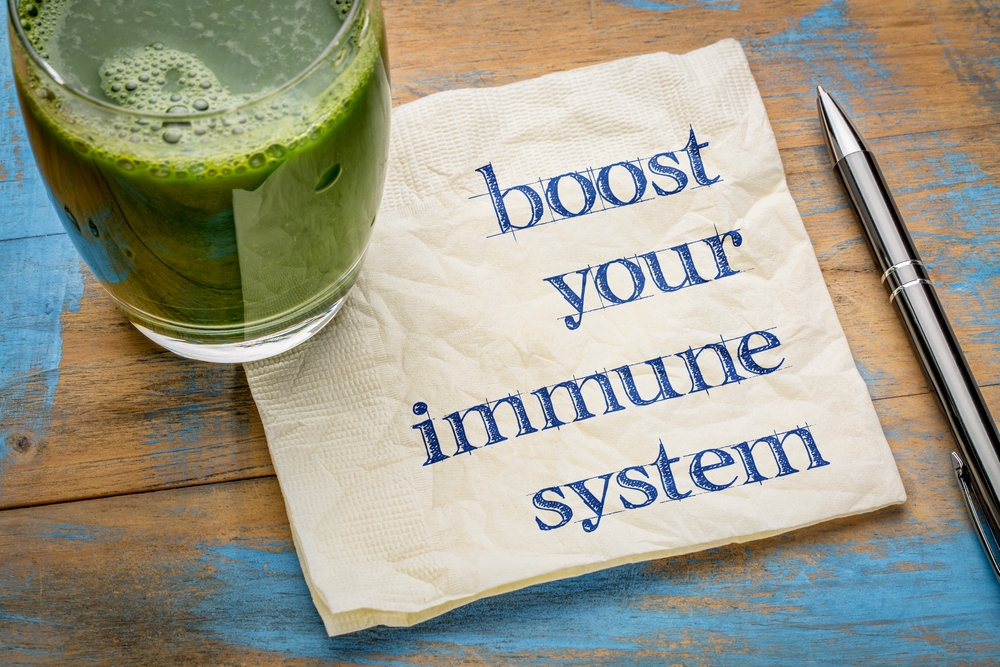You know your immune system is there to keep you healthy, but do you fully understand how this amazing system works? When you learn how to boost your immune system in a healthy, holistic way, you’ll enjoy fewer sniffles, coughs, aches, and pains that come with illness.
Better still, when you have a healthy immune system, you’ll be prepared to fend off scarier, more deadly diseases. You’ll recover from injury and illness quicker. The human immune system protects us all from many outside pathogens and threats. Your immune system helps you heal. It gives you energy and helps you feel truly healthy.
If you’re ready to boost your immune system in a healthy way, here’s what you need to know about staying well. Today we’ll explore how your immune system functions and how you can naturally support and maintain a healthy immune system in a balanced way to help you stay at your peak.

How Your Immune System Works
There’s so much information about boosting your immune system and the importance of keeping your immune system healthy and strong. But many of us may still find the explanation and definitions of this bodily system a bit vague.
Your immune system consists of cells and chemicals that help your body defend itself against infection and invasion of microbes—bacteria, fungi, viruses, parasites, and infection. The immune system is made up of several organs and systems:
- The lymphatic system
- The thymus gland
- The spleen
- Bone marrow
- Blood cells
- Antibodies
Other systems and organs, like the liver, kidneys, lungs, skin, digestive, nervous and circulatory systems, also play a role in helping your body recover and stay healthy. A healthy immune system, however, is the primary protector against infection. White blood cells are our bodies’ biggest defenders, made within the bone marrow, these cells help protect you against any foreign microbes you encounter.
The human immune system is incredible in how it can track and “remember” every microbe that it has fought against. T-lymphocytes and B-lymphocytes are two types of white blood cells that permanently record every battle in your body. By remembering these enemies, the cells can quickly identify and attack the invader again, should you encounter it. This is why you don’t catch the same flu strain multiple times and generally only contract chickenpox once in your lifetime. However, different strains can cross your path, so, unfortunately, you may continue to experience the flu or a cold each season (it’s another variation).
When your immune system faces a foreign invader, you may experience a fever, aches, and pains. Much of this is because your body knows that higher temperatures will destroy certain microbes. As your body fights the intrusion, tissues become inflamed—hot, red, and irritated, and you may experience pain and discomfort. At times, other triggers like allergens can induce an immune response as well—even though your body isn’t “sick” per se, you’re still experiencing hay fever, a runny nose, and inflammation in your body.
It’s crucial that you keep your immune system as healthy as possible by fortifying it with the proper nutrition and support. When you boost your immune system and care for your body, you will feel better and have more energy. You’ll be better prepared to fight off any illness that may come your way.
12 Ways to Boost Your Immune System
If you’re looking for ways to boost your immune system, lifestyle changes and adjustments are often the smartest way to go. You’ll need to implement most of these ideas over the long term. There aren’t many “quick fix” solutions for a better immune system. Here, we’ll review some easy ways you can stay healthy and boost your immune system regularly. For natural products that support the immune system, I’ve made suggestions of some trusted options to explore. Many of the products are from Melaleuca. If you’d like to become a member and enjoy discounted products, click here.
1. Eat a Healthy Diet
When it comes to maintaining a strong immune system, a healthy diet is one of the most potent tools in your arsenal. Unfortunately, many people don’t give a second thought to the foods they eat, especially when life gets hectic and busy—it’s all about grabbing something on the go.
But diet plays a significant role in your immune system health. You should be eating a wide variety of whole, healthy foods. Consume plenty of fruits and vegetables. Choose whole grains over processed foods and select lean proteins and fish. Look for foods that offer plenty of fiber (or supplement your fiber intake to keep things regular). Avoid refined sugar whenever possible.
2. Exercise Regularly
Some studies show that regular exercise—as little as 20 minutes per day—can boost your immune system and help you maintain good health. If you want to keep your body optimized, you need to encourage muscle-building, regular cell turnover, and strong body systems. Exercise is one of your best defenses.
Consider adding strength and resistance training to your exercise plan so you get the benefits of building lean muscle mass and strong bones. Keep your energy up by consuming healthy foods that have plenty of protein and fiber. Stay hydrated while you work out too.
3. Maintain a Healthy Weight
A healthy weight plays an essential role in immune system maintenance. When you’re carrying extra pounds, your body must work harder and can face more strain and, thus, inflammation. Many illnesses like diabetes, high cholesterol, and high blood pressure can also damage your immune system. A healthy weight helps you avoid these risks.
Additionally, maintaining a healthy weight will help you have more energy. Your joints will experience less strain and discomfort, and you’ll be able to stay active and fit. You may even avoid sleep apnea and other sleep issues that can damage your immunity.
4. Get Plenty of Sleep
Speaking of sleep, a regular sleep schedule is another great way to boost your immune system. We all know that a lack of sleep makes us feel run down, tired, and lethargic. If you want to perform at optimal levels and wake up with energy, you’ll need to get the appropriate amount of rest for your body.
A simple herbal supplement like Melatonin can help ensure you get the sleep you need at night. Practice good sleep hygiene by keeping the room cool and dark, turning off your phone before bed, and winding down a few hours before your head hits the pillow. Good sleep will help you stay healthy and strong, no matter your exposure. If you struggle with sleep, I suggest Melaleuca’s RestEZ, which contains a special botanical blend plus Melatonin. To learn more about RestEZ and other natural products, follow this link.
5. Manage Your Stress
A big factor in illness that often gets dismissed is stress. When your stress is out of control, your body will not function optimally. Stress tends to weigh us down and make our bodies produce stress hormones to compensate.
Additionally, when we’re stressed, we often don’t think clearly. We may crave junk food, miss out on sleep, or skip self-care. Stress leads to poor choices, but we can balance it by managing stress through a healthy diet, mindfulness practices, exercise, and positive outlets. If stress and mental health issues continue to be a challenge, you may want to speak to your doctor about a supplement or medication to help you better manage your stressors.
6. Practice Good Dental Hygiene
So much of your health is dependent on a healthy mouth. Your mouth is the gateway to the body—and can also be the gateway to germs and illness. When you have dental problems, you can experience effects in other systems of the body too. Your digestion can be thrown off track, you can feel tired, and some dental problems can even affect the cardiovascular system.
Keep your mouth healthy and clean with regular brushing and flossing. Visit your dentist every six months as directed, and don’t hesitate to address concerns like cavities and gingivitis. Not only do healthy white, straight teeth help you feel better, but they help you look younger too (plus, everyone appreciates nice fresh breath). Look for a natural toothpaste like Melaleuca’s Whitening Tooth Polish that whitens without peroxide or sugars.
7. Protect Your Skin and Fight Germs
Your skin is the largest organ in your body and acts as a barrier between your internal organs and the outside world. If you want to keep germs, infections, and illness at bay, you need to maintain healthy skin. When your skin is dry, cracked, or sensitive (with acne, rashes, rosacea, eczema, or psoriasis), you may have breaks and areas where germs can enter the body and cause infection.
Keep your skin healthy and clean by washing regularly. Use a gentle soap and hand sanitizer when you can’t get to a sink. Keep your skin moisturized and treated well with lotion (I love Renew Intensive Skin Therapy from Melaleuca) and protective care, like a mineral-based sunscreen. Visit a dermatologist annually or as needed to address any concerns.
8. Minimize Your Exposure
If you want to boost your immune system, give it a fighting chance by minimizing your exposure to pathogens and toxins. Now, none of us can exist in a bubble—throughout the day, we all come in contact with things that aren’t great, like pollutants, chemicals, and germs. But whenever possible, minimize your exposure.
Keep a safe distance when you go into crowds. If you’re traveling, follow guidelines to stay safe. In your home, disinfect surfaces, especially areas where you eat and prepare food. Use cleaners that are non-toxic and safe to use around kids, pets, and in the kitchen. Try to seek out natural products whenever possible. It’s important that you don’t live in fear (which can add to your stress) but use common sense and minimize your risk.
9. Get Plenty of Vitamins
Vitamins are essential to life. Our body systems need minerals and vitamins to function correctly. Historically, when people didn’t eat balanced diets, they could become deficient in certain vital nutrients, vitamins, and minerals, and their immune systems would often suffer.
To boost your immune system, make sure you’re getting a very well-balanced diet. Many of the essential nutrients come from plants, but you may also need to supplement with a multi-vitamin pack or D3 supplement. Vitamin D is especially crucial to boost your immune system. We get vitamin D from sunlight. It enhances immune cells and helps us fight inflammation (it also helps you feel energetic), but of course, too much sun has other dangers. You may want to check with your doctor for a blood test to ensure you’re getting enough of this crucial vitamin.

10. Maintain a Healthy Microbiome
Are you familiar with your microbiome? It may sound strange, but your skin, mucus, gut, and other parts of the body are teeming with microorganisms. These microorganisms help moderate your immune system, regulate digestion, and help your blood cells produce antibodies.
To maintain our microbiome, we often need prebiotics and probiotics. While these can come from our diet (again, mainly from vegetables, fruits, and fermented foods), you may need to supplement to ensure you’re getting the right balance. It’s crucial that you get enough fiber to help your microbiome keep things moving through your system. For a great probiotic option, I recommend the Florify Family Pack from Melaleuca—an extremely safe and effective probiotic option.
11. Fight Free-Radicals
Free radicals sound strange to those unfamiliar with the term. When our immune system is under attack, it increases the output of what is called “free radicals.” These are uncharged molecules that are reactive. Excess free radicals can damage the body by stealing electrons from healthy molecules.
We produce free radicals when our body is subject to oxidative stress. To combat these hazards, we should be sure to get plenty of antioxidants. One of the most common is water soluble vitamin C. These can lower our risk of heart disease and certain types of cancer. They’re also a great way to boost your immune system. Food high in antioxidants includes berries, green tea, spinach, kale, red cabbage, beans, and dark chocolate. If you don’t consume enough of these in your diet, you may want to consider a supplement.
12. Manage Inflammation
Many of our immune system problems come from too much inflammation. Now, when we’re sick, we experience some natural inflammation—as the body fights infection and illness. This can come in the form of a fever, the redness we see surrounding a wound, or pain like a sore throat. Too much inflammation can end up being harmful.
Extra weight, a poor diet, lack of exercise, stress, chemical exposure, smoking, and a lack of sleep can all lead to inflammation within the body. To help keep it at bay, we can consume more Omega-3s. These acids come from healthy fats, and they help protect our cells. Omega-3s are found in fish, seaweed, seeds like hemp, flax, chia, legumes (beans), and nuts. If we don’t consume enough of these healthy items in our diet, we may also want to supplement like CoQ10.
As you can see, if you want to boost your immune system, the best method is to practice self-care. Get lots of sleep and exercise. Eat a very healthy, well-rounded diet that’s rich in fruits, vegetables, beans, and lean proteins. Minimize stress and take care of your skin and dental hygiene. For some people, augmenting these areas with vitamins and supplements can help bridge any gaps.
Your immune system is vital and helps keep your body healthy and strong. Give it all the nutrients it needs, and it will ensure you stay well.







